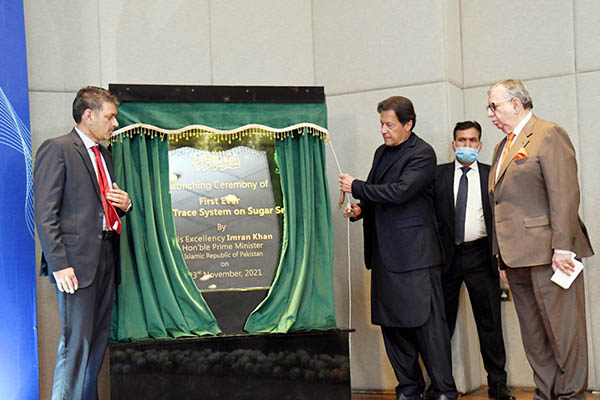
Photo courtesy PID
Premier claims people will be encouraged to pay taxes if they see that public funds are being spent on their welfare
Prime Minister Imran Khan on Tuesday reiterated calls for Pakistani citizens to pay all relevant taxes, warning that the country’s economy could not become sustainable without this.
Addressing the launch ceremony of the Federal Board of Revenue (FBR)’s Track and Trace System for the sugar industry, he regretted that the government did not have “enough money to run the country,” forcing it to take out loans. In Pakistan, he said, “a tax culture was never created” and citizens were never taught that tax evasion was a “bad thing.” He blamed this on the country’s colonial past and his frequent target—the “ruling elite.”
Of Pakistan’s past under colonial rule, he said people almost considered it a “good deed to not pay taxes” to foreign rulers. Additionally, he said, there were people who believed that the taxes collected would never be used for their benefit so they did not want to pay them. When these people saw that public funds were being spent on them and their welfare, their perception would change automatically, he claimed. A third reason, he claimed, was that Pakistan’s “ruling elite” had not wanted a “tax culture” to take root in the country because they could then maintain their lavish lifestyles without facing any questions.
“”It is so important that this [tax] culture is developed in Pakistan because our very sustainability is at stake,” he said, adding that Pakistan’s overall debt had gone from Rs. 6 trillion to Rs. 30 trillion between 2008 and 2018, an inaccurate assertion. According to the State Bank of Pakistan, the country’s public debt in 2018 stood at Rs. 24.95 trillion; it is now equal to around Rs. 40 trillion.
“So our challenge was tax collection and I laud the FBR team for a record tax collection,” he said, adding that the government wanted to have it collect Rs. 8,000 billion.
Of the tax revenue, the prime minister said Rs. 3,000 billion were required for debt repayments. “And we will be left with Rs. 3,000 billion for a population of 220 million,” he said, adding that this would need to cover health, education and infrastructure expenditures. “And then we need to invest, in research and agriculture, which has so much potential,” he said, adding that in order to pay for its plans the government needed to keep taking out loans, which kept raising debt, trapping the country in a debt cycle.
“The only way [debt cycle] will break is if we ramp up our tax collection,” he said, adding that that will only be possible with the use of technology and the track and trace system marks a big step in that direction. He said the new system had already been rolled out for the tobacco industry and now extended to the sugar industry, with plans to expand it to the cement, fertilizer and rebar sectors.
In a statement, the Prime Minister’s Office said the track and trace system would be used to monitor the movement of goods from production to sale. “The scope of electronic surveillance will extend from the production of goods to the utilization by the consumers, which will enhance the country’s revenue generation, bring transparency in the system and prevent tax evasion,” it said.
